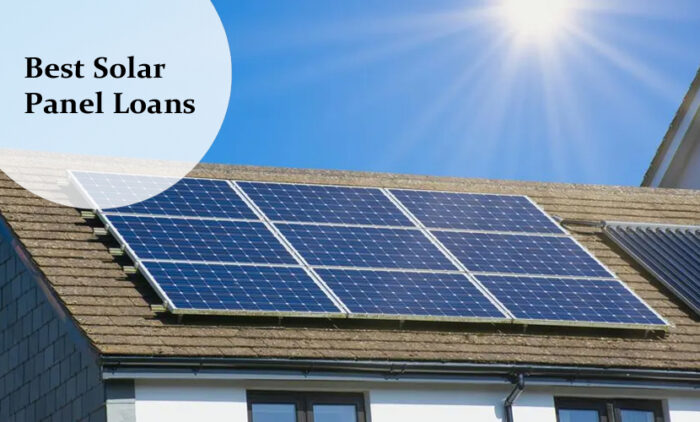The best solar panel loans offer budget-friendly interest rates, minimal fees, no down payment requirements, and flexible terms.

Solar panels are recognized as a reliable home energy source, providing independent power. Although transitioning to solar energy can involve significant costs, there are diverse financing options available to help cover the expenses associated with purchasing and installing solar panels.
What Is A Solar Panel Loan?
A solar loan is an unsecured personal loan designed to cover the costs of solar panels and their installation. You can obtain this type of financing from banks, credit unions, and online lenders.
Solar loans typically range from $1,000 to $100,000, and their annual percentage rates (APRs) generally fall between 6% and 36%.
These loans operate as installment loans, where you receive a lump sum and then repay it through equal monthly installments over a set period, usually ranging from two to seven years.
Unlike home equity financing, solar loans don’t require collateral, meaning your property isn’t at risk if payments are missed. However, the absence of collateral can result in slightly higher interest rates.
10 Best Solar Panel Loans
You have options for obtaining a solar loan: you can get it from your solar provider, or you can directly approach a bank, credit union, or online lender.
When deciding on a provider, consider factors like loan amount, loan term, requirements, and more to choose the best panel loan lender that suits your needs.
SoFi
SoFi stands out as a popular online lending platform that offers unsecured fixed-rate personal loans across all states. Established in 2011, it has facilitated over $50 billion in loans.
SoFi provides loan options ranging from $5,000 to $100,000, making it an excellent choice for individuals looking to borrow substantial amounts. However, the specific loan amounts may vary depending on your state of residence.
With repayment periods spanning from two to seven years, SoFi offers flexibility, especially for those with a solid credit score (minimum 650) and an annual income of at least $45,000. Additionally, SoFi allows applicants to submit joint applications, although co-signers are not accepted.
Eligible borrowers benefit from low APRs, and it’s noteworthy that SoFi does not charge origination fees, late fees, or prepayment penalties.
GoodLeap
GoodLeap is the leading point-of-sale financing lender for solar contractors, supporting over 40,000 professionals, and there’s a good chance your solar installer works with them.
Their Flexpay loans come with low APRs, extended terms, and a unique structure that allows you to make low-interest payments during the first 18 months.
Additionally, you have the option to settle your loan using federal tax credits. Importantly, GoodLeap doesn’t impose prepayment penalties.
The application process is quick and straightforward, offering an instant decision through a mobile device.
LightStream
LightStream offers loans with a low minimum, a maximum interest rate, and a rate-beat program. Their unsecured personal loans range from $5,000 to $100,000, and the loan amounts vary based on the purpose of the loan.
One of the appealing aspects is the attractive and flexible terms, and LightStream distinguishes itself by refraining from charging origination, late payment, or prepayment fees. Additionally, borrowers can enjoy a 0.50% rate discount by enrolling in auto-pay with the lender.
Best Solar Panel Loans – Upgrade
Upgrade personal loans come with several attractive features, including discounts on rates and direct payments to creditors. What makes it even more appealing is the accommodating minimum credit score requirement.
These loans offer both secured and joint options, with the added benefit of multiple rate discounts. Managing your loan payments is made easy with the use of a mobile app.
Furthermore, if you’re looking for a loan for home improvement, Upgrade provides flexibility with extended repayment terms. However, it’s important to be aware of an origination fee, and you won’t have the option to choose your payment date.
To be eligible, a minimum credit score of 560 is required, along with at least one account on your credit history. Notably, Upgrade accepts income from various sources, such as alimony, retirement, child support, Social Security, and more.
LendingPoint
LendingPoint provides personal loans ranging from $2,000 to $36,500, with the minimum in Georgia being $3,500. The repayment period spans from 24 to 72 months, allowing for flexibility over two to six years.
Yet, there are two things to be mindful of with LendingPoint. Firstly, the maximum annual percentage rates (APRs) can be on the higher side.
However, having a good credit score can help avoid this. Secondly, there are origination fees, which can be as much as 10%, and these depend on the state you live in.
Dividend Finance
Dividend Finance is a lender that works through solar contractors when you want to finance a loan. To get all the details about how it works, it’s best to contact a contractor directly.
Some contractors may offer repayment periods of up to 25 years. What’s noteworthy is that dividend finance might provide low annual percentage rates (APRs), like 0.99%, under certain conditions.
One cool thing about this San Francisco-based company is that you don’t need to make a down payment. Plus, there are no penalties if you decide to pay off your loan early.
Best Solar Panel Loans – SunPower
SunPower is a top choice for getting a loan to buy solar panels. They have a special financing branch called SunPower Financial. With their loans, you can easily get the SunPower Equinox solar system.
Their loans have low-interest rates, which means you don’t have to pay much extra money. They also give you a long time to pay back the money, and you can borrow a lot.
If you qualify, they might even let you pay back with zero interest, and you get up to 25 years to do it. It’s a great option for making solar power more affordable for you.
Universal Credit
Universal Credit is a well-established online lender offering personal loans ranging from $1,000 to $50,000 through its network of lenders, with a repayment period extending from three to seven years.
While Universal Credit makes personal loans accessible, especially for individuals with poor credit, it’s crucial to consider a few factors.
Firstly, the interest rates it charges may be higher compared to competitive alternatives. Additionally, Universal Credit imposes an origination fee ranging from 5.25% to 9.99%, deducted directly from the loan amount.
When determining the required loan amount, it’s essential to factor in this fee to ensure you receive the precise funds needed.
Discover
Discover is a renowned online bank that not only offers credit cards but also provides retirement solutions and personal loans throughout all 50 states.
Serving as more than just a lending platform, it boasts an easy online application process via your phone, a highly rated support team, and swift fund disbursement.
However, you can borrow amounts ranging from $2,500 to $40,000, with a repayment period spanning three to seven years.
Unlike some lenders that dictate the loan duration, Discover gives you the flexibility to choose your preferred repayment timeline.
While Discover may impose charges for late payments and doesn’t offer discounts for auto-pay, it stands out by not levying origination fees or fees for early repayment, distinguishing it as a favorable option compared to other lenders.
Best Solar Panel Loans – Navy Federal
A Navy Federal personal loan might be the perfect fit for you, offering various loan amounts, attractive features, and swift fund disbursement.
With repayment options spanning 1 to 5 years, eligible members may even enjoy discounted interest rates. If you consolidate debts, they can directly transfer funds to your creditors.
Membership in the Navy Federal Credit Union is a prerequisite, and there’s no strict credit score requirement.
Simply provide personal information, including contact details and financial and employment details, to apply.
Conclusion
If you’ve chosen to secure a loan for your solar energy investment, it’s essential to pay close attention to factors such as the annual percentage rate (APR), origination fees, and the repayment period.
Furthermore, be aware that your interest fees or any additional charges may escalate over time, ultimately increasing the overall cost of your renewable energy system.



